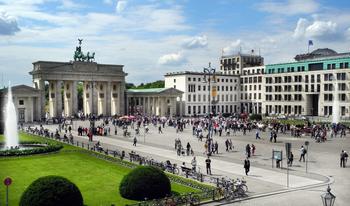German Excellence Strategy: Berlin’s Higher Education Institutions Overcome First Hurdle
Five research projects based at Freie Universität Berlin or with participation by Freie Universität asked to submit full proposals
Oct 03, 2017
The Cluster projects of the Berlin universities are characterized by a particularly large disciplinary spectrum and include both the natural sciences, technology, and life sciences as well as the humanities and social sciences.
Image Credit: Bernd Wannenmacher
Freie Universität Berlin, Humboldt-Universität zu Berlin, Technische Universität Berlin, and Charité - Universitätsmedizin Berlin performed very well in the preliminary decision regarding the Cluster proposals. Through this funding line the German federal and state governments will promote strong university research fields, at first for a seven-year period. A total of nine research projects from Berlin were invited to submit full proposals, which must be submitted to the DFG by February 2018.
Five initiatives are based at Freie Universität Berlin or with participation by Freie Universität. The projects were selected from a total of 195 proposal outlines for Clusters that were submitted by 63 universities from all 16 German states. The final decision on the allocation of Excellence Clusters will be made in September 2018.
The scholars and scientists involved are now invited to present their projects in full to the international panels of experts. All full proposals must be submitted by February 21, 2018. Decisions regarding the projects to be funded are to be announced in September 2018. Successful clusters will receive funding for two seven-year terms starting in 2019. The three above-named universities in Berlin, Charité, and Berlin University of the Arts had submitted 16 proposals in all.
The proposals submitted by Freie Universität Berlin are:
Contestations of the Liberal Script (SCRIPTS)
Global Challenges for Liberal Democracy as a Model of Organization
Designated spokespersons: Prof. Dr. Tanja Börzel (Freie Universität Berlin), Prof. Dr. Michael Zürn (Freie Universität Berlin/Wissenschaftszentrum Berlin, WZB)
Applicant university: Freie Universität Berlin
MATH+ The Berlin Mathematics Research Center
The Power of Mathematics
Designated spokespersons: Prof. Günter M. Ziegler (Freie Universität Berlin), Prof. Michael Hintermüller (Humboldt-Universität zu Berlin), Prof. Martin Skutella (Technische Universität Berlin)
Applicant universities: Freie Universität Berlin, Humboldt-Universität zu Berlin, Technische Universität Berlin
NeuroCure: Comprehensive approaches to neurological and psychiatric disorders – from mechanisms to interventions
Understanding and Treating Brain Disease
Designated spokesperson: Prof. Dr. Dietmar Schmitz (Charité – Universitätsmedizin Berlin)
Applicant universities: Freie Universität Berlin and Humboldt-Universität zu Berlin are parent universities of the Charité – Universitätsmedizin Berlin
Temporal Communities – Doing Literature in a Global Perspective
How Literature Reaches Out through Space and Time
Designated spokespersons: Prof. Dr. Anita Traninger, Prof. Dr. Andrew James Johnston (Freie Universität Berlin)
Applicant university: Freie Universität Berlin
Topoi. Stability and Instability in Ancient Civilizations
A New Way of Understanding Pre-modern Societies
Designated spokespersons: Prof. Dr. Monika Trümper (Freie Universität Berlin), Prof. Dr. Gerd Graßhoff (Humboldt-Universität zu Berlin)
Applicant universities: Freie Universität Berlin, Humboldt-Universität zu Berlin
The concepts in detail:
To find out which outlines from which institutions in Berlin were asked to flesh out their concepts in further detail, please visit our joint website, www.berlin-university-alliance.de/en.
About the Excellence Strategy:
In order to further strengthen Germany’s position as an outstanding place for research in the long term and to further improve the country’s international competitiveness, the government designed a program to continue the development of German universities successfully begun with the Excellence Initiative (2005 to 2017).
The Excellence Strategy comprises two funding lines: Through Excellence Clusters, internationally competitive research fields will be funded with up to 10 million euros annually. Universities that win funding for several clusters can also receive additional funding enabling them to continue to develop their Excellence position. Altogether 533 million euros are available annually in the two funding lines. Proposals in the Excellence Strategy may be submitted by individual universities as well as alliances of universities within Germany. The German Research Foundation (DFG) and the German Research Council are conducting the review and selection process.

